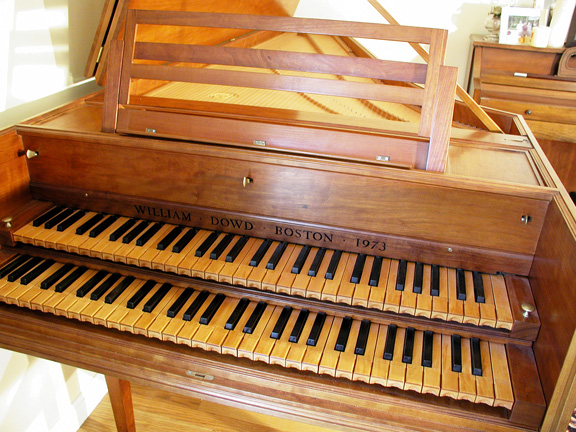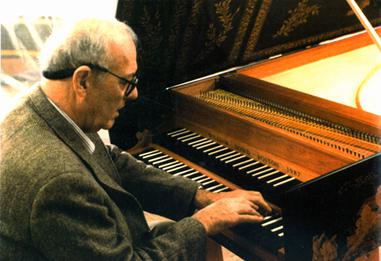(From Dec 6, 2008.)
A life well spent?
That’s the goal, isn’t it? For any of us. Not necessarily to be enshrined in a newspaper’s obituary (although few people would protest such a proposition), but to have affected even a few lives, to have left the world better; or failing that, different, than it would have been. Leading a life that is, in some way(s), directed outward as well as inward, cultivating a passion and then sharing it; assisting others in discovering or enjoying that passion. Not an inconsiderable accomplishment, by any standard.
Of course, some shoot higher. For instance, William Dowd (who died this week, aged 86, in Reston, VA–which makes me wish I’d met him). Dowd’s life’s work was reviving the craftmanship of harpsichords (a skill perfected in the 17th-century, when harpsichords were the electric guitars of their time). What prompted this singular ambition? After serving in World War II, interested in music but not properly trained, he fell in love with the quaint instrument after attending several classical music concerts. Along with lifelong friend and partner in crime Frank Hubbard, the two men engaged in the modest mission of (in their own words) “reviving single-handed the whole baroque orchestra.”
More from Dowd: “They were (no longer) making anything that was remotely like an antique harpsichord. We discovered a resonant, flowering sound which we liked. We, with the enthusiasm and rash brashness of the young, believed we knew how to bring back the authentic instrument upon which the early harpsichord music was all based.”
Over 800 harpsichords later, Dowd’s handiwork is scattered across countries all over the world, and arguably comprise a collection of the most frequently played–and appreciated–instruments. Says his wife, Pegram Epes Dowd: “Men like that ame back from World War II, and they believed there was nothing they could not do. They really were risk takers. I think it was very heroic.”
It seems somehow appropriate that in assessing the work of what could fairly, if somewhat inadequately, be described as a quintessential 20th-century man, one is obliged to discuss a type of music (and the instrument upon which most of it was composed) made several centuries before he was born. It goes beyond the obvious, but essential, actuality that Dowd was keeping alive music that cannot (and fortunately, for the forseeable future, will not) die; his life is necessarily larger (in scope, in ambition, in consequence) because he devoted his energies toward a force that endures simply by virtue of being. It is not a stretch, then, to propose that Dowd will continue on through the music played on the instruments he assembled.
We shall not see his like again. That this encomium is offered up so frequently is, for once and in a refreshing exception, a demonstration of the power of cliche: that we’ve had so many individuals deemed worthy of this praise says much about our potential as human beings. It is, nevertheless, more than a little bittersweet to consider the larger implications of Dowd’s ambition. Will we have enterprising craftsmen dedicating their best years to the refinement of harpsichord construction in the 21st century? Will we have people even listening to harpsichord music? The answer, obviously, is yes; at least to the second query. But it still warrants consideration: even though every generation necessarily mourns the inevitable passing of its so-called best and brightest, when it comes to artistic endeavors, once we lose advocates (not to mention the actual artists) that part of our world becomes a little bit smaller. Over time, these losses constitute an erosion that simply can’t be replicated.
Progress in virtually every other earthly endeavor, from medicine to science to sports, is always pulling us forward to the future: advancements are the currency of innovation and they render the old ways irrelevant, dispensable. The opposite might be said to be the case with art: innovation does occur, and it is welcome and inexorable, but entire periods of time are contained within particular artistic movements; these eras are a very real way in which we can assess ourselves. Put more prosaically, no one is going to lament the loss of, say, 20th-century (to say nothing of 17th-century!) medical practices; our collective progress means less pain and more salubrity for us all. The art being created today (and that will be created tomorrow) is, to be certain, as valid, meaningful and useful as the works enshrined in museums and box sets. Indeed, our art today naturally says as much about us now as art from yesterday speaks of the way we lived, then. Still, while we celebrate the exceptional life and achievements of William Dowd, we should also hope that his work serves to inspire an individual, not yet been born, who will find himself drawn irretrievably toward a past he is able to apprehend, miraculously, through the music.


